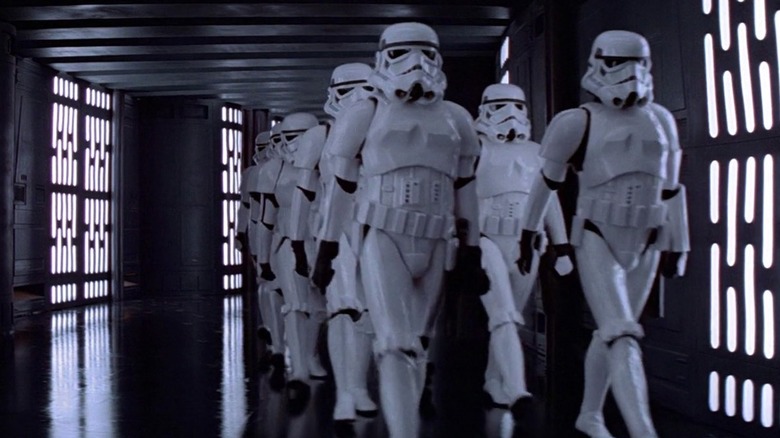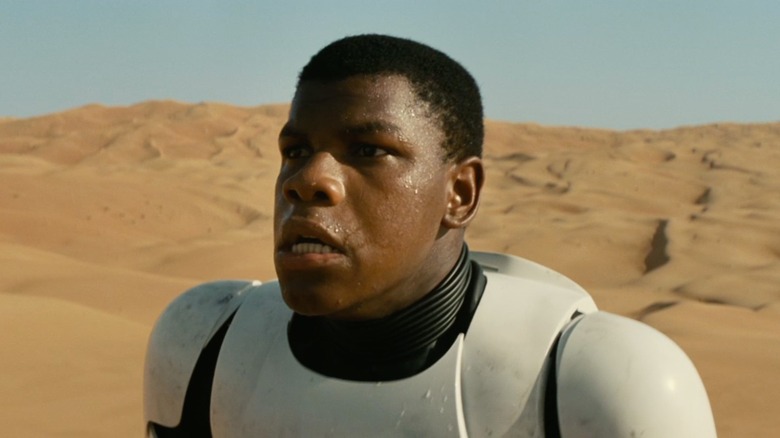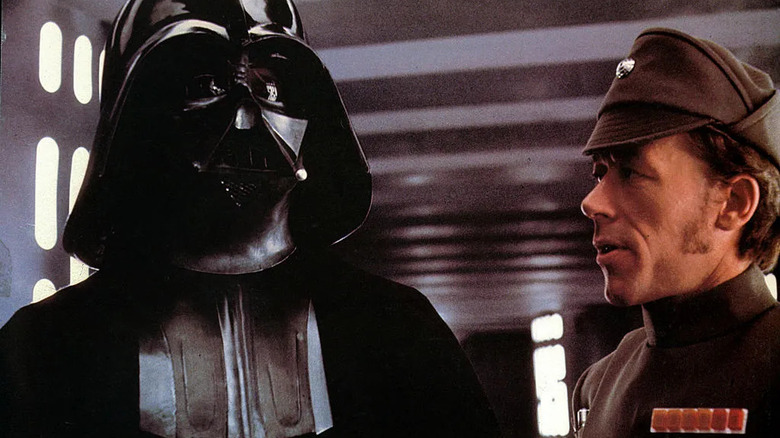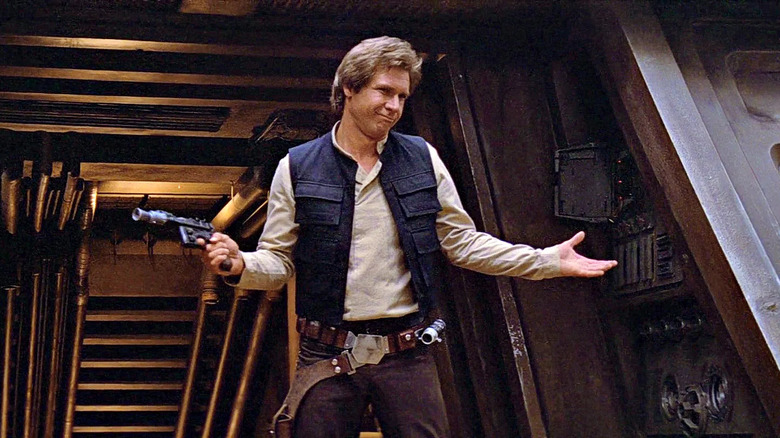Why So Many Sci-Fi Villains Have Such Bad Aim
If a Stormtrooper in "Star Wars" managed to shoot and kill Luke Skywalker, Han Solo, and Princess Leia, it would probably instigate an existential crisis for the Stormtrooper. It may take a while during the blaster fight for the attacking Stormtroopers to even acknowledge that no shots were being returned. After the smoke cleared, the Stormtroopers would cautiously approach their prey, making sure they were dead. This is something, it seems, that had never happened before. Did we ... Did we just win? We don't win. We miss. We make sure the heroes have trouble escaping, but they always escape. That's the nature of the universe.
The fact that Stormtroopers never manage to shoot their targets has long been a running gag among "Star Wars" fans, very much the same way redshirts always die on "Star Trek." Stormtroopers are certainly an obstacle in "Star Wars," and the heroes must often fight their way through a front line of them, but given how few people Stormtroopers have killed over the 45-year history of "Star Wars," their risk of actually being offed by an errant blaster is practically nil. Stormtroopers are, at best, a measure to slow the advance of heroes. They are never in place to stop anyone. If Stormtroopers can be taken out by a species of friendly teddy bears armed with logs and ropes, they're certainly not much of a threat. If you go down to the woods today, you're in for a big surprise.
As it turns out, there is a canonical reason for Stormtroopers' notoriously bad aim. It seems that their helmets are the culprits.
The helmets
Stormtrooper helmets are difficult to see out of. One might recall a line of dialogue from the original "Star Wars" when Luke (Mark Hamill) says that he couldn't see a thing wearing the helmet. According to "Star Wars" canon, it's not that Stormtroopers lack skill in weapons handling, but that their shaded eyeholes cut into visibility. That's it. The helmets are hard to see out of. And since Stormtroopers are rarely seen sans helmets (a notable exception being Finn from the most recent film cycle), it's reasonable to assume that the helmets are to blame.
One might notice that when Luke, Han, or any other characters throughout "Star Wars" disguise themselves as Stormtroopers, they always seem to hit their targets when they remove their helmets. There have also been very few Stormtrooper POV shots in any iteration of "Star Wars" (video games notwithstanding) so audiences have every reason to believe that any amount of visual information has been cut off.
After decades of seeing firefights with Stormtroopers, it started to get a little ridiculous that they weren't a threat anymore. The helmet line — as much of a throwaway gag as a plot point — indeed covers for that. It would also make sense that the Empire would insist on visual conformity among their soldiery rather than weapons efficiency. This is an Empire, mind you, than also infamously built a moon-sized Death Star that could be destroyed with the use of a few well-placed proton torpedoes.
Bad aim in all of sci-fi
There is, of course, a broader and much simpler dramatic reason why sci-fi villains across the genre all have bad aim: The heroes cannot die. It may be exciting to see Commander Riker duck behind a chest-high wall to avoid enemy phaser fire, but audiences may immediately understand that Riker will emerge from the ensuing battle unscathed. A Starfleet officer may be injured, but it won't be something that a capable Starfleet doctor won't be able to repair. The Avengers may fight wave after wave of monsters or robots, but they will rarely die or be injured. The battles are not meant to pose a threat to the heroes; we know they will win.
But if a firefight doesn't add a threat, then why include them other than mere, base, visceral thrills? Dramatically speaking, a firefight adds two things: An element of difficulty, and a ticking clock. There is a version of "Return of the Jedi" wherein Han Solo (Harrison Ford), in attempting to shut down the planet-bound shield generator for the Death Star, merely walks up to a panel and flips a switch. While Han's mission would be complete, it wouldn't be very exciting to watch. As such, Han must work under pressure, avoiding enemy fire while trying to unlock a door. Rather than standing around, he fights. This is a difficult task and requires courage and tenacity to complete. A firefight adds to the character of the hero, willing to traverse danger to complete their task.
Tension and fan theory
Additionally, a firefight delays our heroes in their task, making for a sense of desperation. Concurrent to Han Solo's tinkering in "Return of the Jedi" is a space battle that was meant to time out to Han's shutting down of the Death Star shields. When Han was delayed in his task, the stakes were raised up in space, making for a more violent space battle. When everything relies on timing, a firefight can feel like a wildcard. It doesn't matter if the heroes aren't in any real danger from the Stormtroopers' bad aim. It matters that they have been stymied. Tension is now much higher, as the heroes have been found out. The Stormtroopers will not be killing them today — that's not what Stormtroopers do — but the heroes will now have to use their wits to escape. How, the audience will now excitedly ask, will they get out of this one?
Of course, once those types of dramatic writing have been employed too many times, and Stormtroopers have failed at their jobs for decades, fans grow concerned and must invent headcanon to account for how often bad guys miss. And sometimes headcanon can be far more interesting than anything a screenwriter puts on record. What if, for instance, anyone drafted to be a Stormtrooper (once the clones ran out) secretly objected to the rule of the Empire, and made a secret pledge to sabotage the Empire's war efforts by deliberately missing their targets during minor scrapes? Or what if the Empire expanded so quickly that securing millions of guns became difficult, and they had to resort to using substandard weapons?
Whether canonical or not, though, Stormtroopers miss for a reason.



